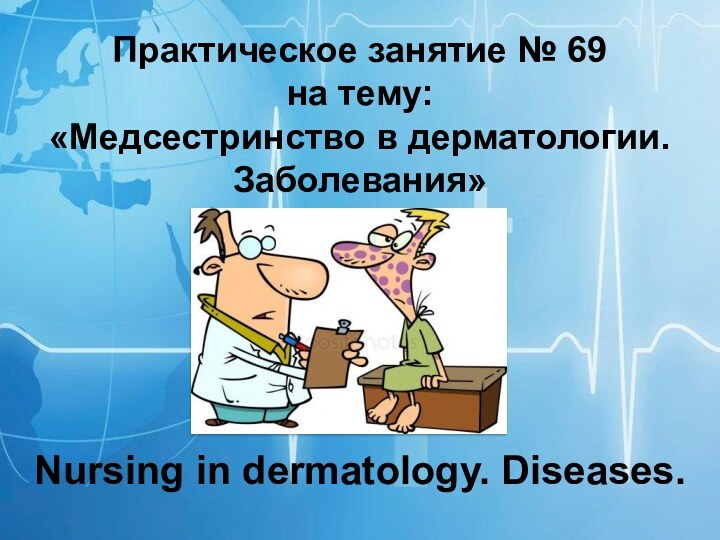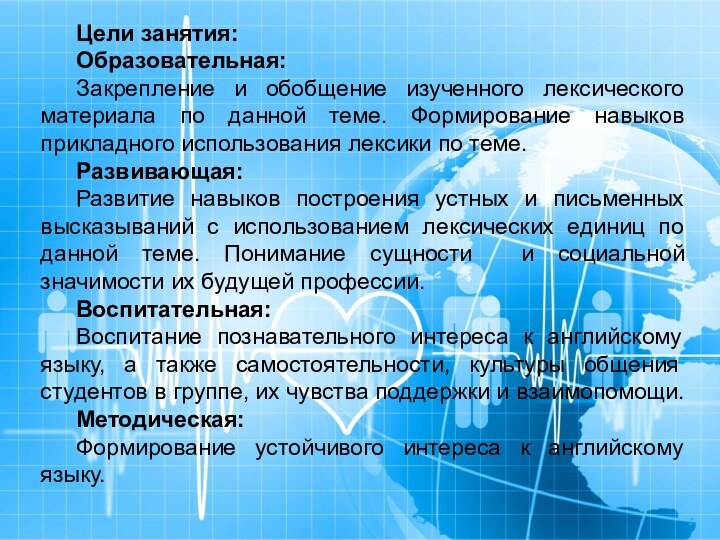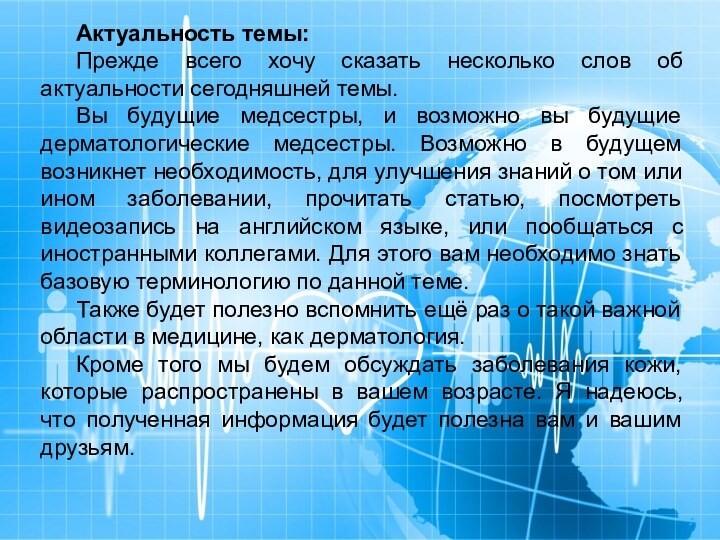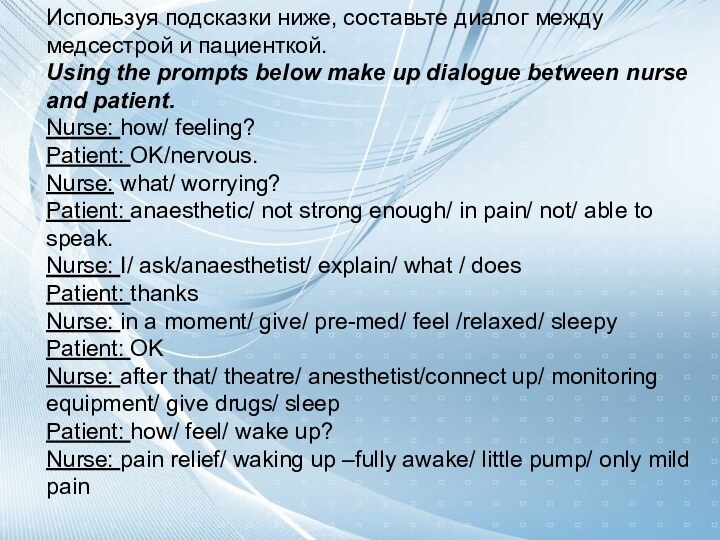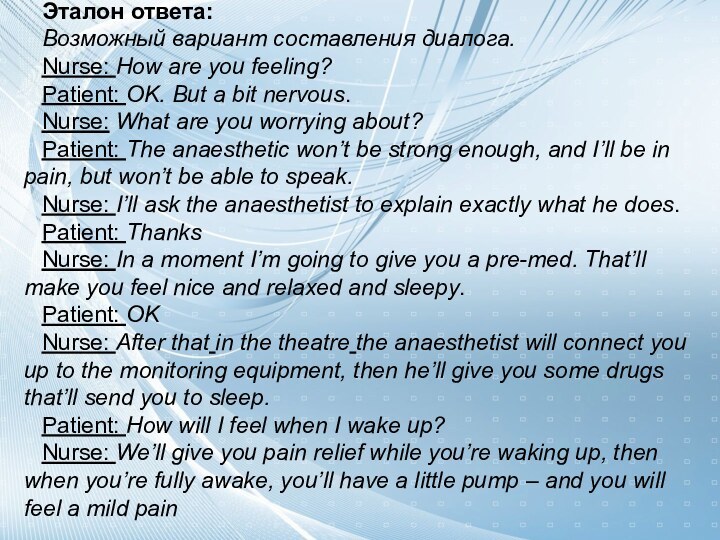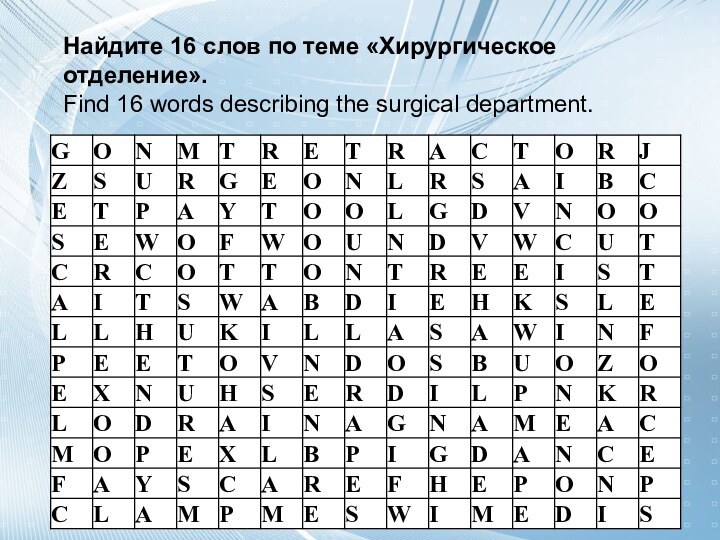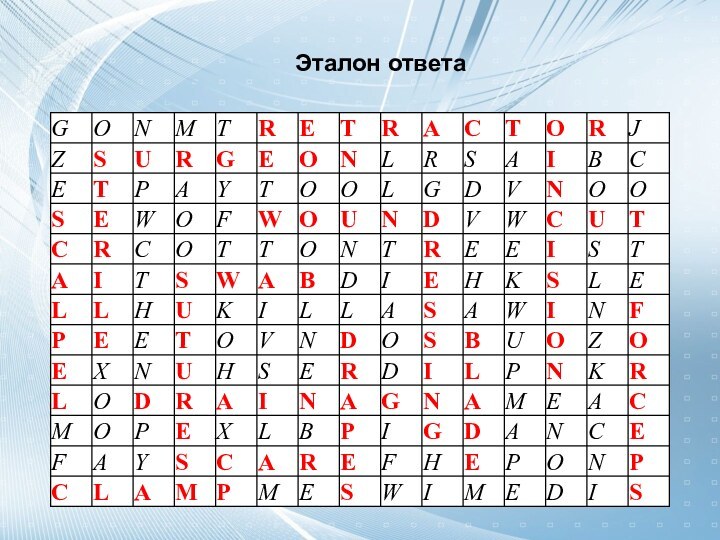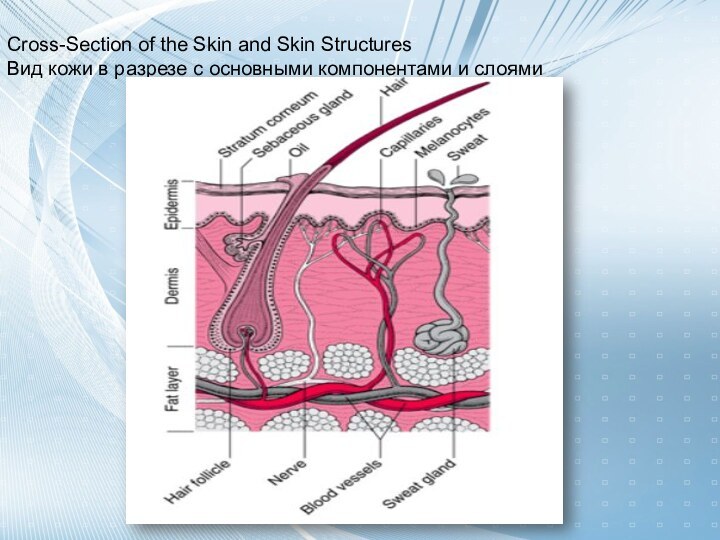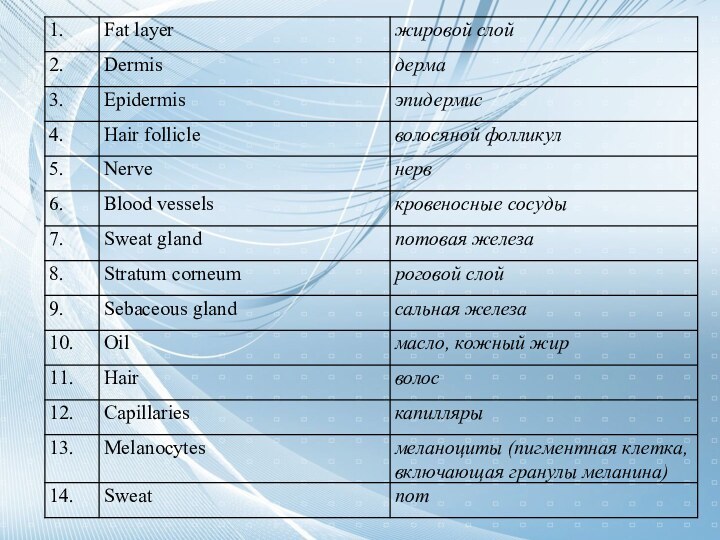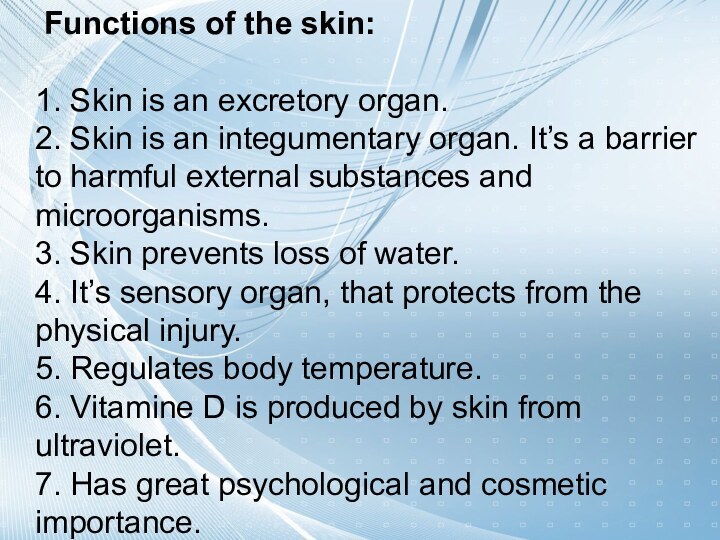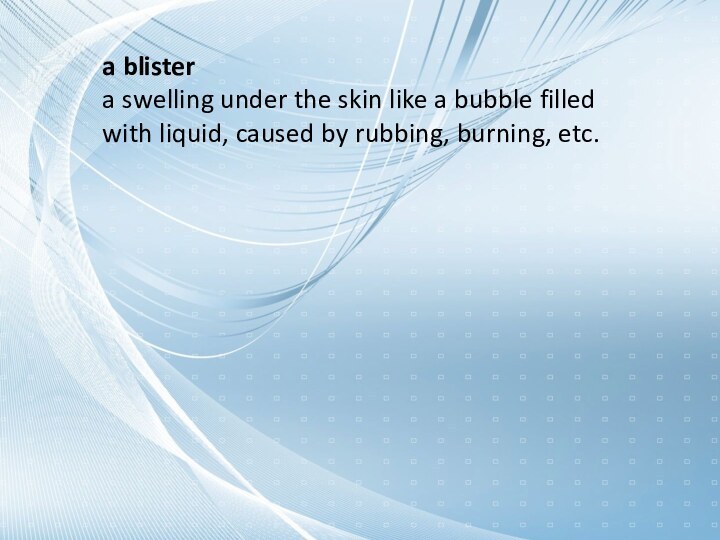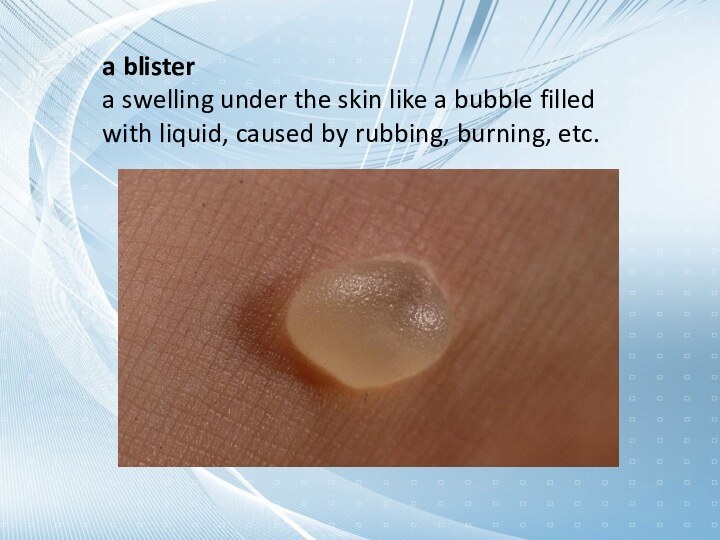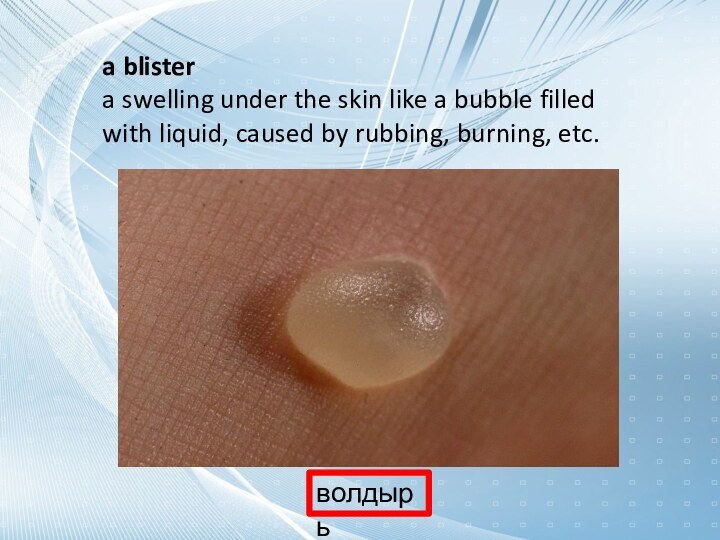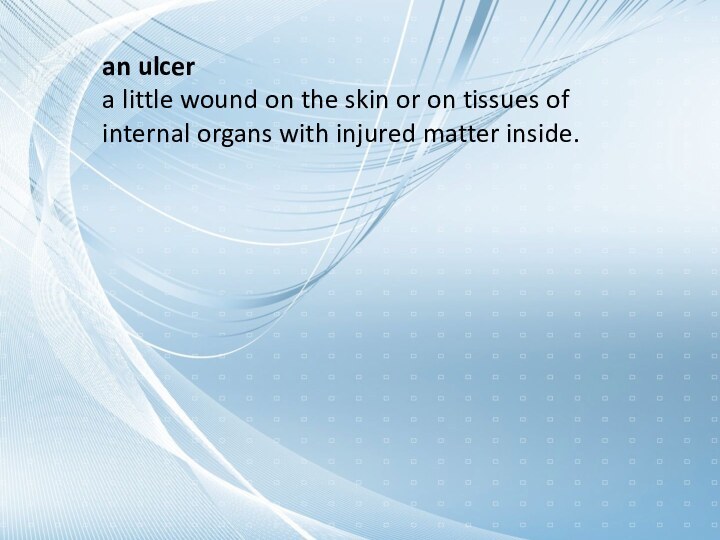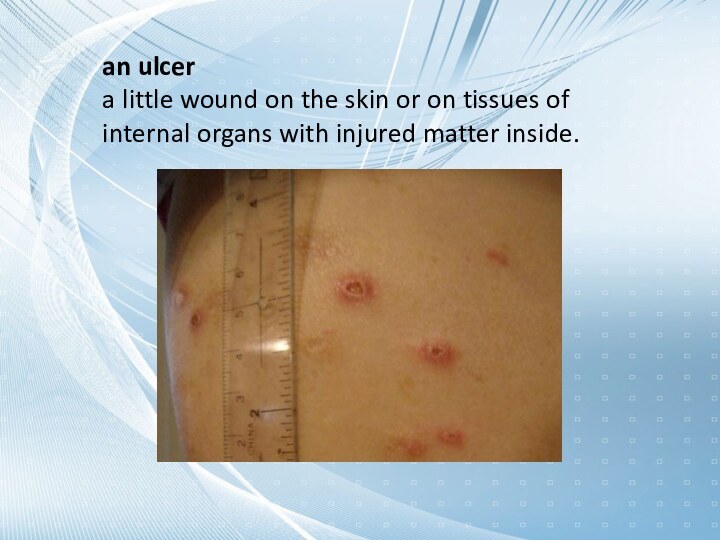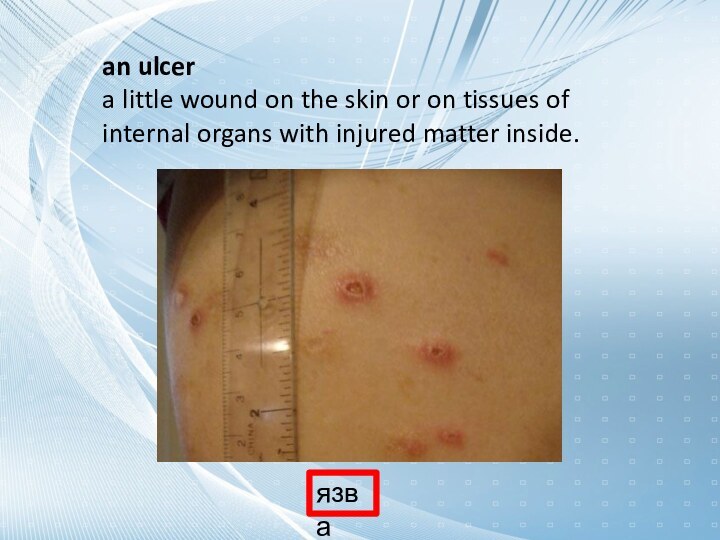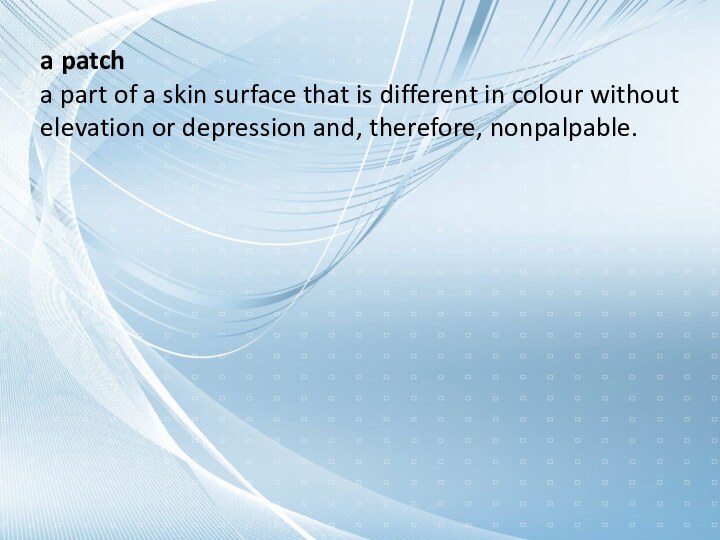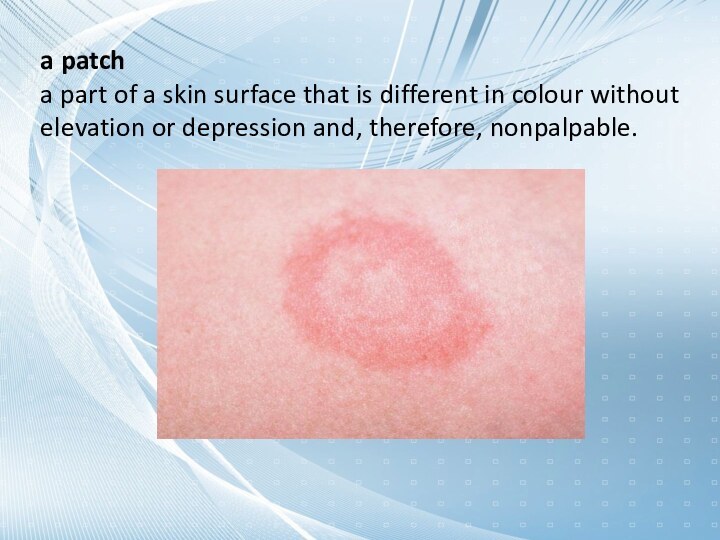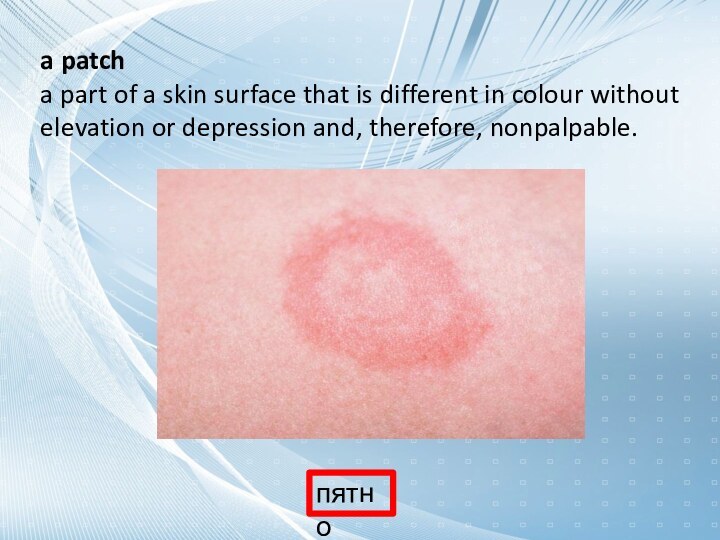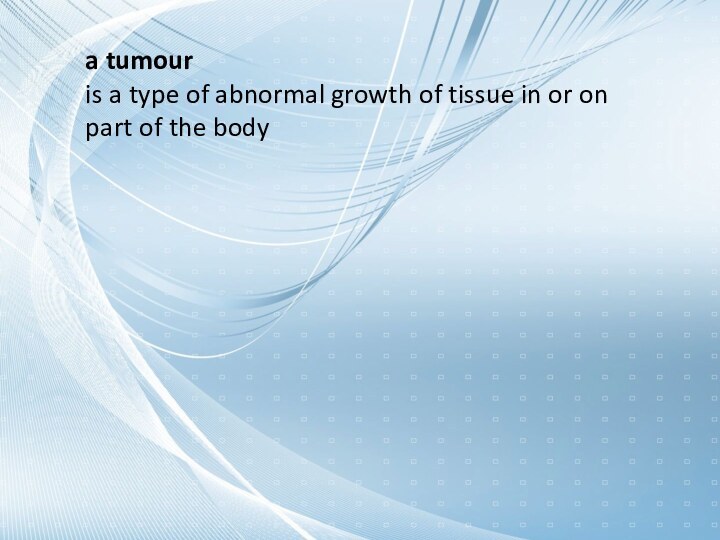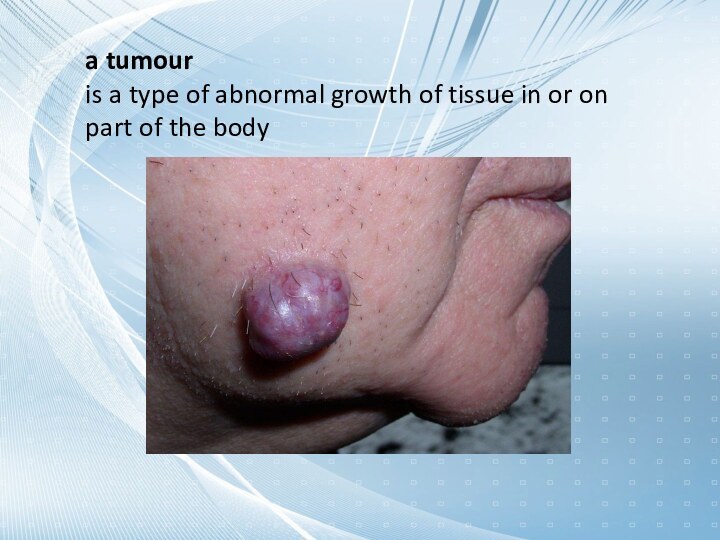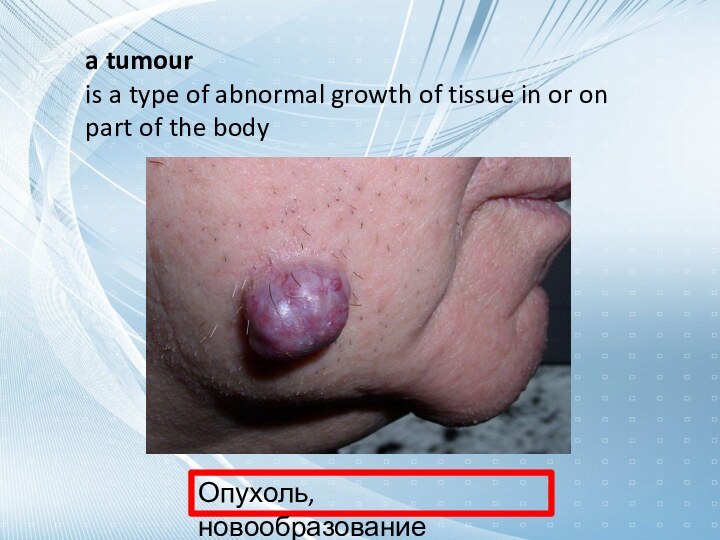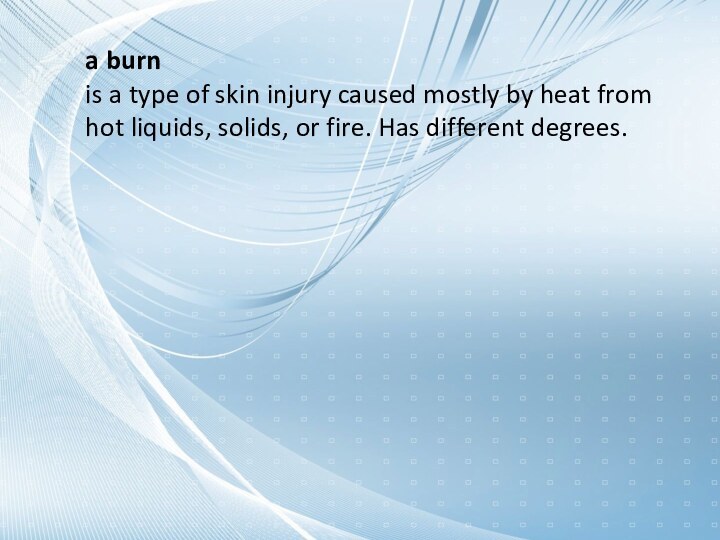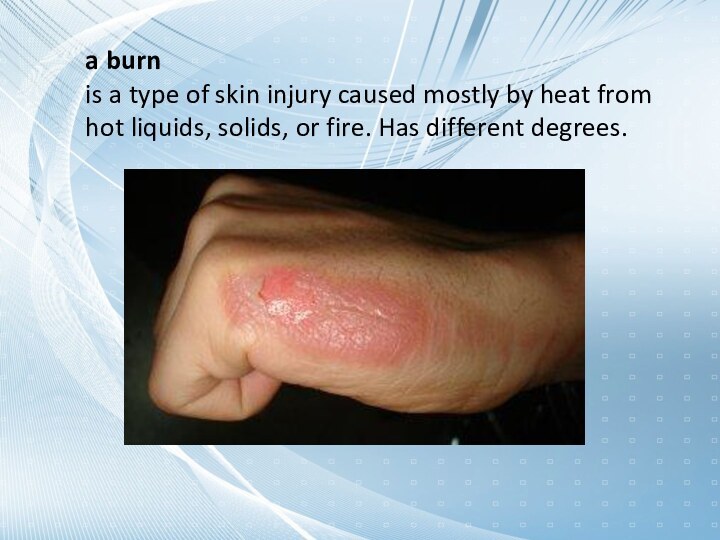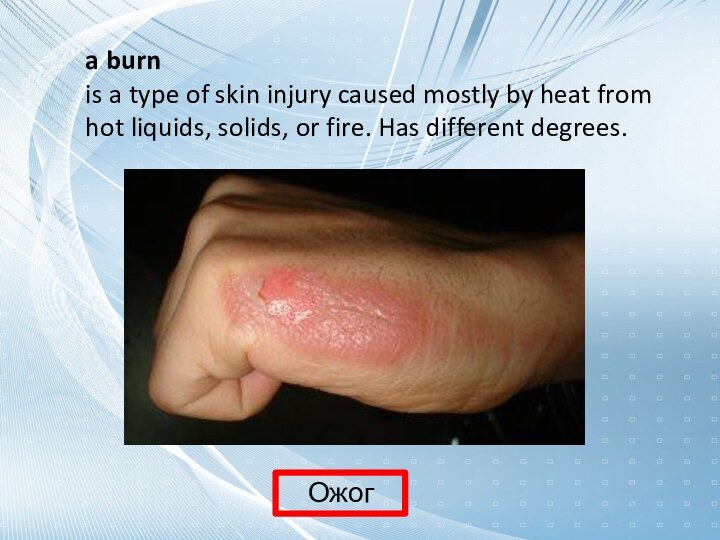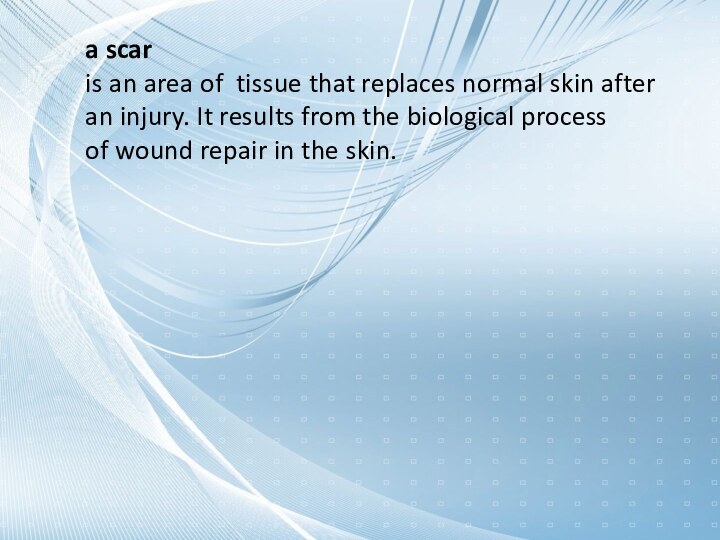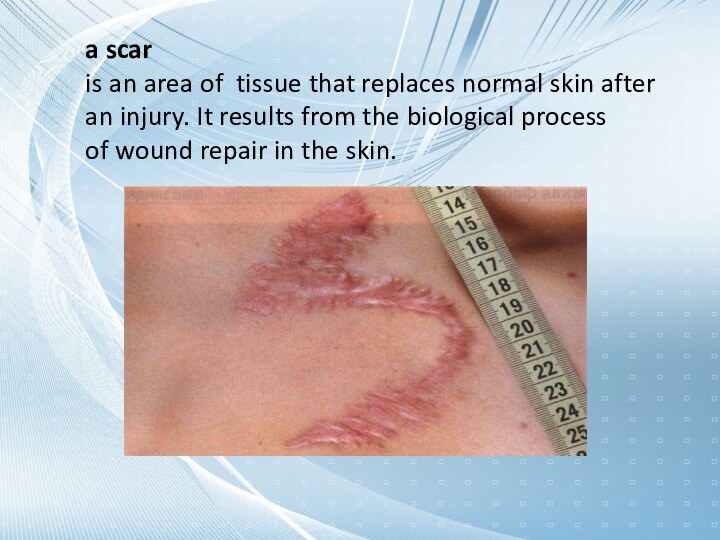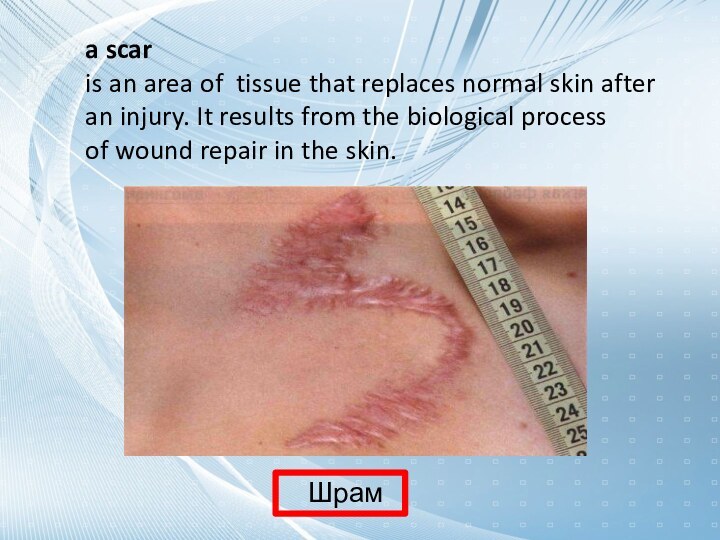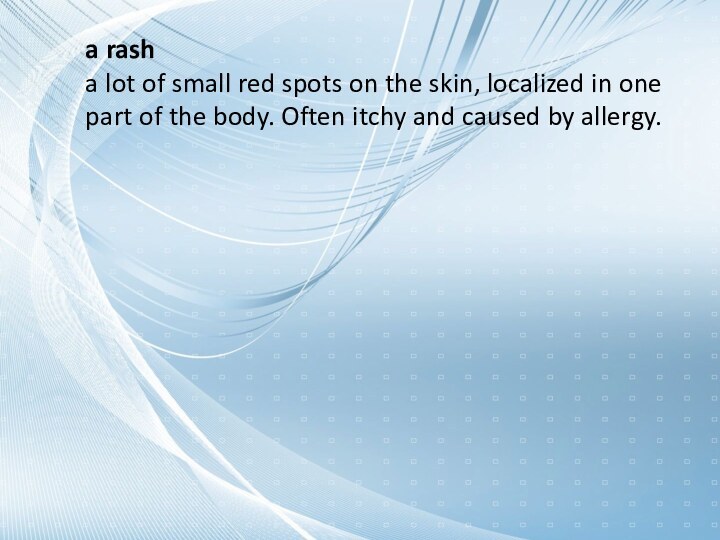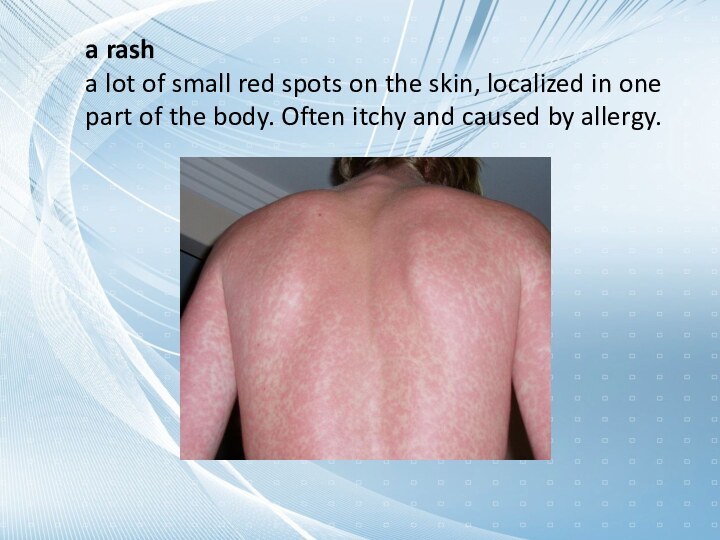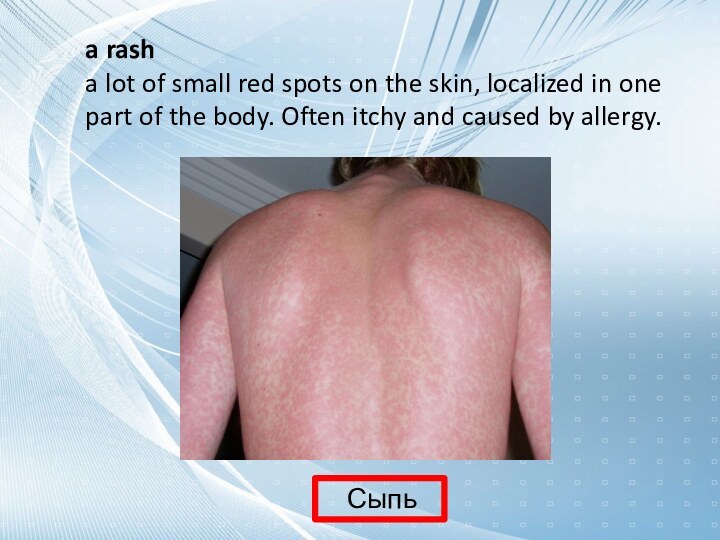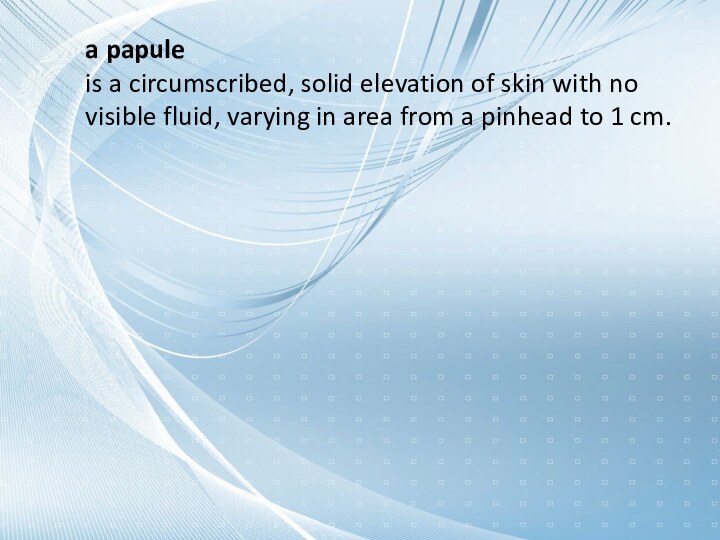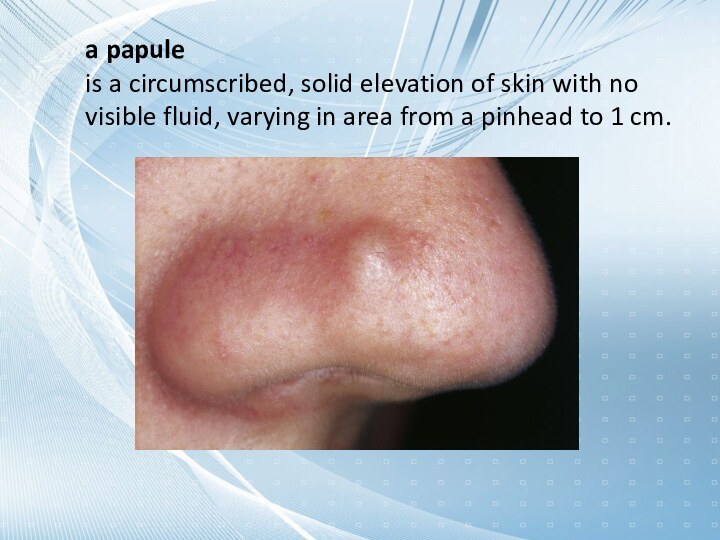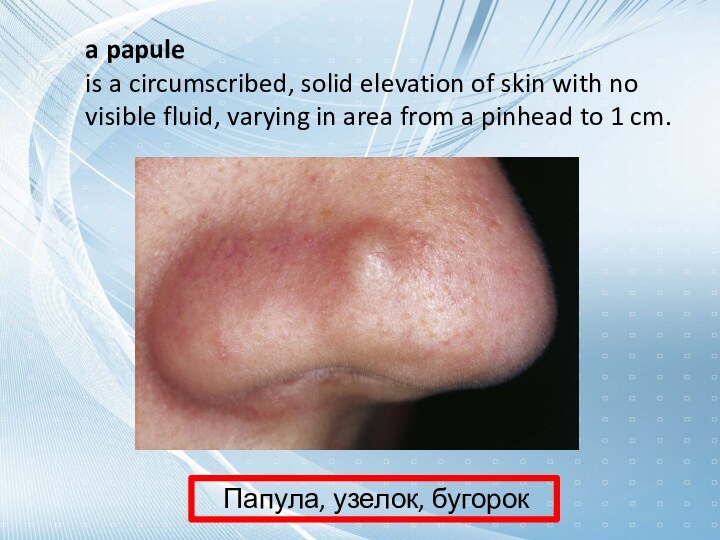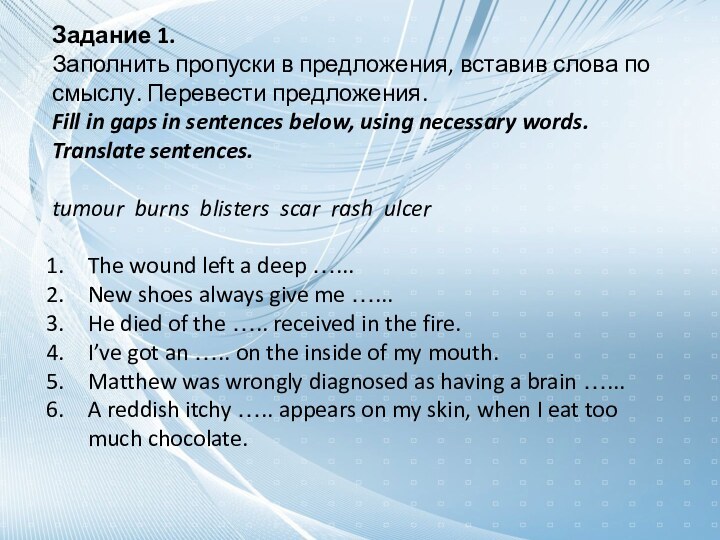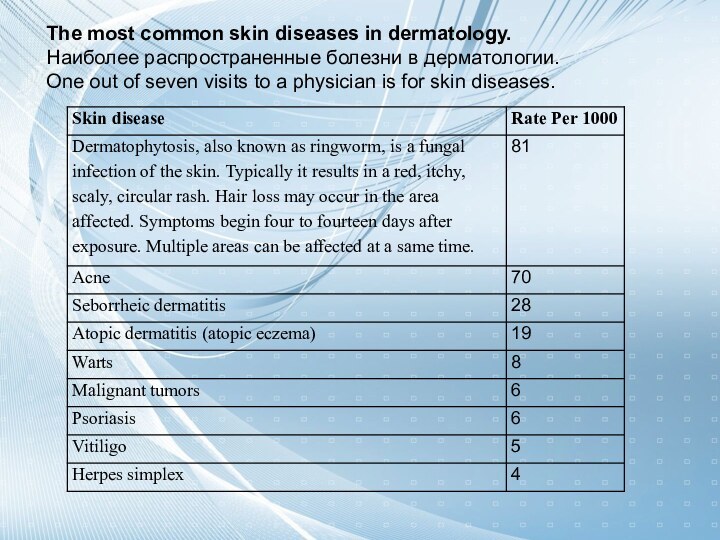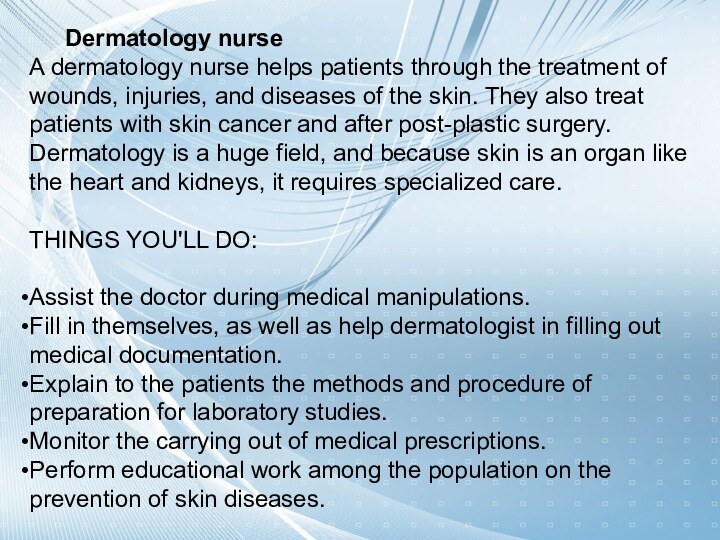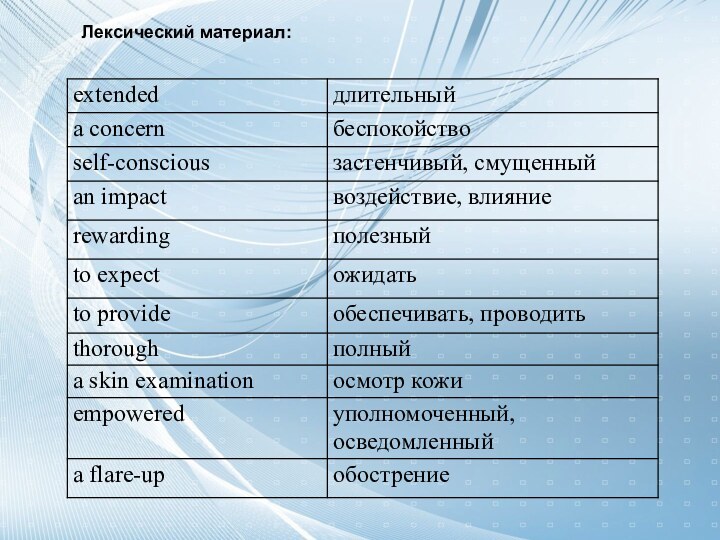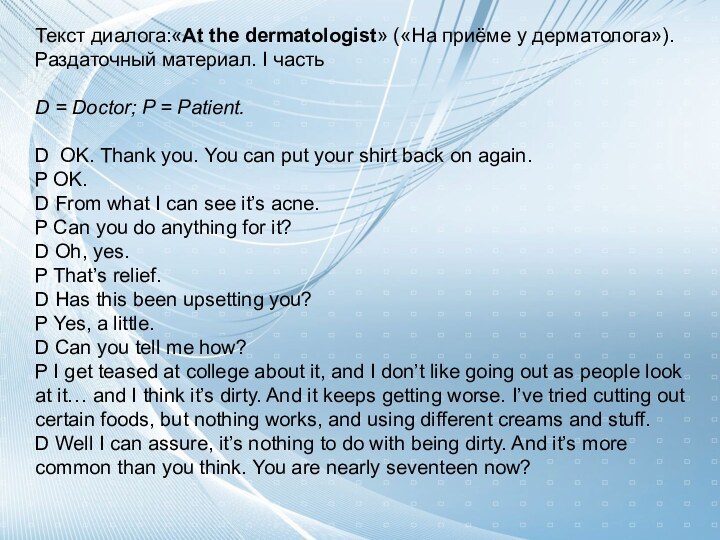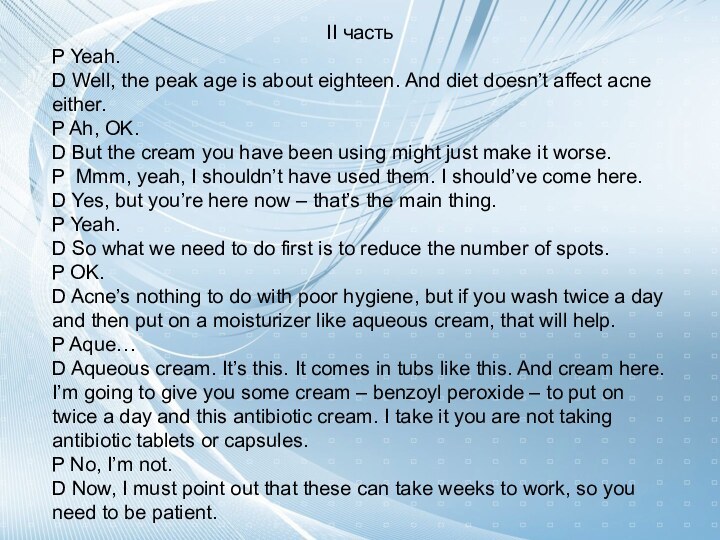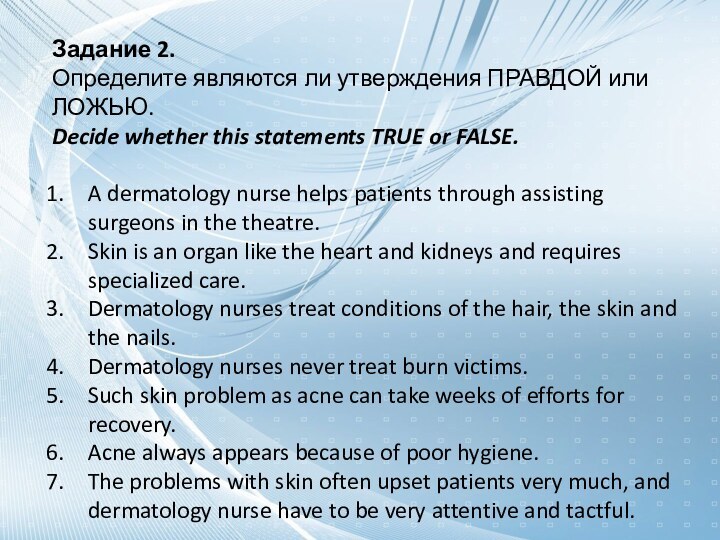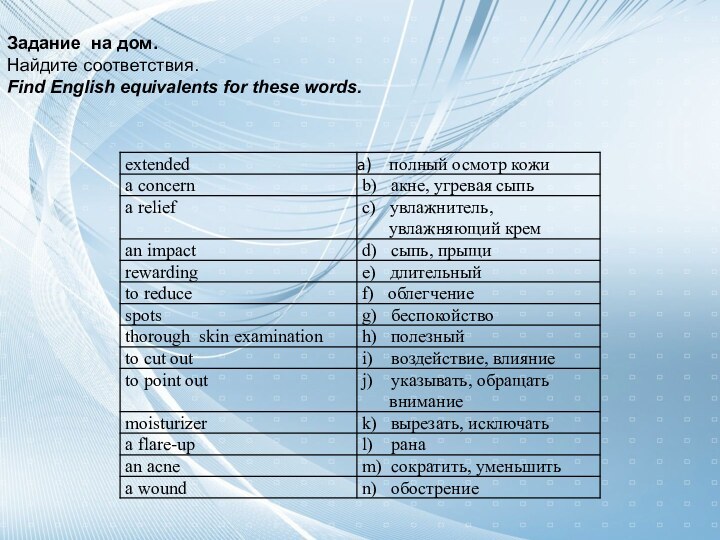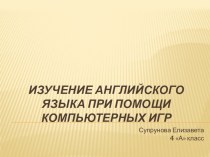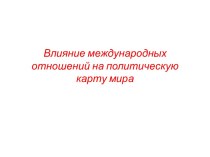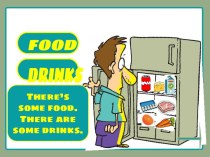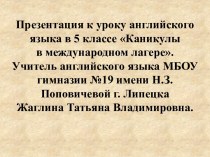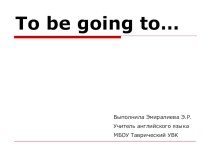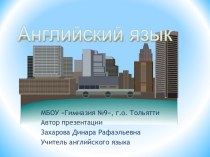Слайд 2
Цели занятия:
Образовательная:
Закрепление и обобщение изученного лексического
материала по данной теме. Формирование навыков прикладного использования лексики
по теме.
Развивающая:
Развитие навыков построения устных и письменных высказываний с использованием лексических единиц по данной теме. Понимание сущности и социальной значимости их будущей профессии.
Воспитательная:
Воспитание познавательного интереса к английскому языку, а также самостоятельности, культуры общения студентов в группе, их чувства поддержки и взаимопомощи.
Методическая:
Формирование устойчивого интереса к английскому языку.
Слайд 3
Актуальность темы:
Прежде всего хочу сказать несколько слов об
актуальности сегодняшней темы.
Вы будущие медсестры, и возможно вы будущие
дерматологические медсестры. Возможно в будущем возникнет необходимость, для улучшения знаний о том или ином заболевании, прочитать статью, посмотреть видеозапись на английском языке, или пообщаться с иностранными коллегами. Для этого вам необходимо знать базовую терминологию по данной теме.
Также будет полезно вспомнить ещё раз о такой важной области в медицине, как дерматология.
Кроме того мы будем обсуждать заболевания кожи, которые распространены в вашем возрасте. Я надеюсь, что полученная информация будет полезна вам и вашим друзьям.
Слайд 4
Используя подсказки ниже, составьте диалог между медсестрой и
пациенткой.
Using the prompts below make up dialogue between
nurse and patient.
Nurse: how/ feeling?
Patient: OK/nervous.
Nurse: what/ worrying?
Patient: anaesthetic/ not strong enough/ in pain/ not/ able to speak.
Nurse: I/ ask/anaesthetist/ explain/ what / does
Patient: thanks
Nurse: in a moment/ give/ pre-med/ feel /relaxed/ sleepy
Patient: OK
Nurse: after that/ theatre/ anesthetist/connect up/ monitoring equipment/ give drugs/ sleep
Patient: how/ feel/ wake up?
Nurse: pain relief/ waking up –fully awake/ little pump/ only mild pain
Слайд 5
Эталон ответа:
Возможный вариант составления диалога.
Nurse: How are you feeling?
Patient: OK.
But a bit nervous.
Nurse: What are you worrying about?
Patient: The anaesthetic
won’t be strong enough, and I’ll be in pain, but won’t be able to speak.
Nurse: I’ll ask the anaesthetist to explain exactly what he does.
Patient: Thanks
Nurse: In a moment I’m going to give you a pre-med. That’ll make you feel nice and relaxed and sleepy.
Patient: OK
Nurse: After that in the theatre the anaesthetist will connect you up to the monitoring equipment, then he’ll give you some drugs that’ll send you to sleep.
Patient: How will I feel when I wake up?
Nurse: We’ll give you pain relief while you’re waking up, then when you’re fully awake, you’ll have a little pump – and you will feel a mild pain
Слайд 6
Найдите 16 слов по теме «Хирургическое отделение».
Find
16 words describing the surgical department.
Слайд 8
Cross-Section of the Skin and Skin Structures
Вид кожи
в разрезе с основными компонентами и слоями
Слайд 10
Functions of the skin:
1. Skin is an
excretory organ.
2. Skin is an integumentary organ. It’s a
barrier to harmful external substances and microorganisms.
3. Skin prevents loss of water.
4. It’s sensory organ, that protects from the physical injury.
5. Regulates body temperature.
6. Vitamine D is produced by skin from ultraviolet.
7. Has great psychological and cosmetic importance.
Слайд 11
a blister
a swelling under the skin like a
bubble filled with liquid, caused by rubbing, burning, etc.
Слайд 12
a blister
a swelling under the skin like a
bubble filled with liquid, caused by rubbing, burning, etc.
Слайд 13
a blister
a swelling under the skin like a
bubble filled with liquid, caused by rubbing, burning, etc.
волдырь
Слайд 14
an ulcer
a little wound on the skin or
on tissues of internal organs with injured matter inside.
Слайд 15
an ulcer
a little wound on the skin or
on tissues of internal organs with injured matter inside.
Слайд 16
an ulcer
a little wound on the skin or
on tissues of internal organs with injured matter inside.
язва
Слайд 17
a patch
a part of a skin surface that
is different in colour without elevation or depression and,
therefore, nonpalpable.
Слайд 18
a patch
a part of a skin surface that
is different in colour without elevation or depression and,
therefore, nonpalpable.
Слайд 19
a patch
a part of a skin surface that
is different in colour without elevation or depression and,
therefore, nonpalpable.
пятно
Слайд 20
a tumour
is a type of abnormal growth of tissue
in or on part of the body
Слайд 21
a tumour
is a type of abnormal growth of tissue
in or on part of the body
Слайд 22
a tumour
is a type of abnormal growth of tissue
in or on part of the body
Опухоль, новообразование
Слайд 23
a burn
is a type of skin injury caused mostly by heat
from hot liquids, solids, or fire. Has different degrees.
Слайд 24
a burn
is a type of skin injury caused mostly by heat
from hot liquids, solids, or fire. Has different degrees.
Слайд 25
a burn
is a type of skin injury caused mostly by heat
from hot liquids, solids, or fire. Has different degrees.
Ожог
Слайд 26
a scar
is an area of tissue that replaces normal skin after an
injury. It results from the biological process of wound repair
in the skin.
Слайд 27
a scar
is an area of tissue that replaces normal skin after an
injury. It results from the biological process of wound repair
in the skin.
Слайд 28
a scar
is an area of tissue that replaces normal skin after an
injury. It results from the biological process of wound repair
in the skin.
Шрам
Слайд 29
a rash
a lot of small red spots on
the skin, localized in one part of the body. Often
itchy and caused by allergy.
Слайд 30
a rash
a lot of small red spots on
the skin, localized in one part of the body. Often
itchy and caused by allergy.
Слайд 31
a rash
a lot of small red spots on
the skin, localized in one part of the body. Often
itchy and caused by allergy.
Сыпь
Слайд 32
a papule
is a circumscribed, solid elevation of skin with
no visible fluid, varying in area from a pinhead
to 1 cm.
Слайд 33
a papule
is a circumscribed, solid elevation of skin with
no visible fluid, varying in area from a pinhead
to 1 cm.
Слайд 34
a papule
is a circumscribed, solid elevation of skin with
no visible fluid, varying in area from a pinhead
to 1 cm.
Папула, узелок, бугорок
Слайд 35
Задание 1.
Заполнить пропуски в предложения, вставив слова по
смыслу. Перевести предложения.
Fill in gaps in sentences below, using
necessary words. Translate sentences.
tumour burns blisters scar rash ulcer
The wound left a deep …...
New shoes always give me …...
He died of the ….. received in the fire.
I’ve got an ….. on the inside of my mouth.
Matthew was wrongly diagnosed as having a brain …...
A reddish itchy ….. appears on my skin, when I eat too much chocolate.
Слайд 36
The most common skin diseases in dermatology.
Наиболее распространенные
болезни в дерматологии.
One out of seven visits to a
physician is for skin diseases.
Слайд 37
Dermatology nurse
A dermatology nurse helps patients through the
treatment of wounds, injuries, and diseases of the skin.
They also treat patients with skin cancer and after post-plastic surgery. Dermatology is a huge field, and because skin is an organ like the heart and kidneys, it requires specialized care.
THINGS YOU'LL DO:
Assist the doctor during medical manipulations.
Fill in themselves, as well as help dermatologist in filling out medical documentation.
Explain to the patients the methods and procedure of preparation for laboratory studies.
Monitor the carrying out of medical prescriptions.
Perform educational work among the population on the prevention of skin diseases.
Слайд 39
Melissa O'Neil dermatology nurse practitioner
Hello, my name is
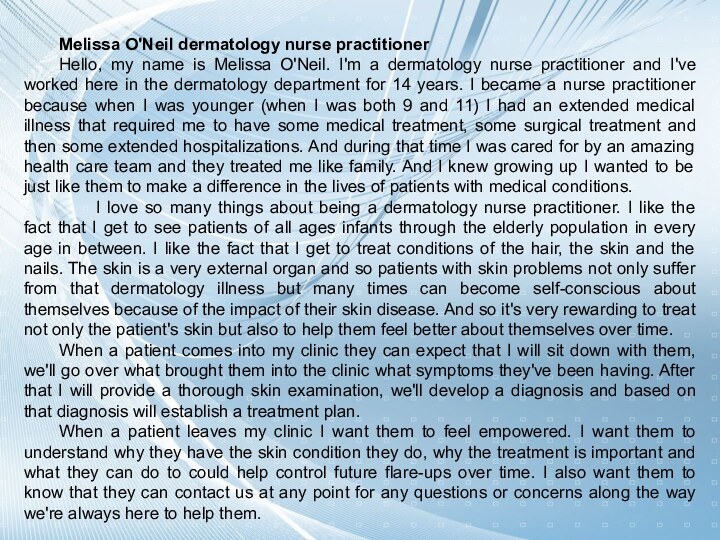
Melissa O'Neil. I'm a dermatology nurse practitioner and I've
worked here in the dermatology department for 14 years. I became a nurse practitioner because when I was younger (when I was both 9 and 11) I had an extended medical illness that required me to have some medical treatment, some surgical treatment and then some extended hospitalizations. And during that time I was cared for by an amazing health care team and they treated me like family. And I knew growing up I wanted to be just like them to make a difference in the lives of patients with medical conditions.
I love so many things about being a dermatology nurse practitioner. I like the fact that I get to see patients of all ages infants through the elderly population in every age in between. I like the fact that I get to treat conditions of the hair, the skin and the nails. The skin is a very external organ and so patients with skin problems not only suffer from that dermatology illness but many times can become self-conscious about themselves because of the impact of their skin disease. And so it's very rewarding to treat not only the patient's skin but also to help them feel better about themselves over time.
When a patient comes into my clinic they can expect that I will sit down with them, we'll go over what brought them into the clinic what symptoms they've been having. After that I will provide a thorough skin examination, we'll develop a diagnosis and based on that diagnosis will establish a treatment plan.
When a patient leaves my clinic I want them to feel empowered. I want them to understand why they have the skin condition they do, why the treatment is important and what they can do to could help control future flare-ups over time. I also want them to know that they can contact us at any point for any questions or concerns along the way we're always here to help them.
Слайд 40
Текст диалога:«At the dermatologist» («На приёме у дерматолога»).
Раздаточный материал. I часть
D = Doctor; P = Patient.
D
OK. Thank you. You can put your shirt back on again.
P OK.
D From what I can see it’s acne.
P Can you do anything for it?
D Oh, yes.
P That’s relief.
D Has this been upsetting you?
P Yes, a little.
D Can you tell me how?
P I get teased at college about it, and I don’t like going out as people look at it… and I think it’s dirty. And it keeps getting worse. I’ve tried cutting out certain foods, but nothing works, and using different creams and stuff.
D Well I can assure, it’s nothing to do with being dirty. And it’s more common than you think. You are nearly seventeen now?
Слайд 41
II часть
P Yeah.
D Well, the peak age is
about eighteen. And diet doesn’t affect acne either.
P Ah,
OK.
D But the cream you have been using might just make it worse.
P Mmm, yeah, I shouldn’t have used them. I should’ve come here.
D Yes, but you’re here now – that’s the main thing.
P Yeah.
D So what we need to do first is to reduce the number of spots.
P OK.
D Acne’s nothing to do with poor hygiene, but if you wash twice a day and then put on a moisturizer like aqueous cream, that will help.
P Aque…
D Aqueous cream. It’s this. It comes in tubs like this. And cream here. I’m going to give you some cream – benzoyl peroxide – to put on twice a day and this antibiotic cream. I take it you are not taking antibiotic tablets or capsules.
P No, I’m not.
D Now, I must point out that these can take weeks to work, so you need to be patient.
Слайд 42
Задание 2.
Определите являются ли утверждения ПРАВДОЙ или ЛОЖЬЮ.
Decide
whether this statements TRUE or FALSE.
A dermatology nurse helps
patients through assisting surgeons in the theatre.
Skin is an organ like the heart and kidneys and requires specialized care.
Dermatology nurses treat conditions of the hair, the skin and the nails.
Dermatology nurses never treat burn victims.
Such skin problem as acne can take weeks of efforts for recovery.
Acne always appears because of poor hygiene.
The problems with skin often upset patients very much, and dermatology nurse have to be very attentive and tactful.
Слайд 43
Задание на дом.
Найдите соответствия.
Find English equivalents for
these words.
Слайд 44
Задание на дом.
Сопоставьте название болезней с их описанием.
Match
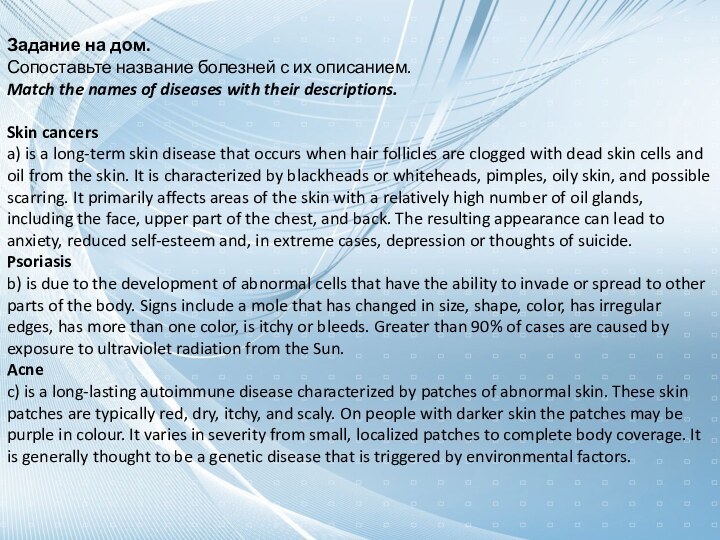
the names of diseases with their descriptions.
Skin cancers
a) is
a long-term skin disease that occurs when hair follicles are clogged with dead skin cells and oil from the skin. It is characterized by blackheads or whiteheads, pimples, oily skin, and possible scarring. It primarily affects areas of the skin with a relatively high number of oil glands, including the face, upper part of the chest, and back. The resulting appearance can lead to anxiety, reduced self-esteem and, in extreme cases, depression or thoughts of suicide.
Psoriasis
b) is due to the development of abnormal cells that have the ability to invade or spread to other parts of the body. Signs include a mole that has changed in size, shape, color, has irregular edges, has more than one color, is itchy or bleeds. Greater than 90% of cases are caused by exposure to ultraviolet radiation from the Sun.
Acne
c) is a long-lasting autoimmune disease characterized by patches of abnormal skin. These skin patches are typically red, dry, itchy, and scaly. On people with darker skin the patches may be purple in colour. It varies in severity from small, localized patches to complete body coverage. It is generally thought to be a genetic disease that is triggered by environmental factors.
